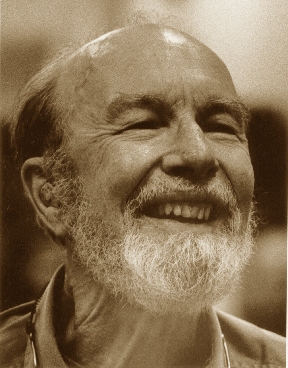Always Looking--People Who Made A Difference IV
Pete Seeger
A member of the Community Church of New York, Pete Seeger was born
to a musicologist and a music teacher. Music and activism blended
naturally for Seeger, who at sixteen saw a performance that has since
directed his life. As Seeger recalled: "That summer I visited a
square dance festival in Asheville, North Carolina, and fell in love
with the old-fashioned five-string banjo, rippling out a rhythm to one
fascinating song after another." These songs seemed frank, straightforward, honest. "I liked the rhythms," Seeger said. "I liked the melodies, time tested by generations of singers. Above all, I liked the words."
Seeger entered Harvard in 1936, but Harvard proved a weaker
attraction than the life of a traveling musician; Seeger left college in
his sophomore year, setting out to absorb American folk music straight
from its roots in communities across the country. Swapping watercolor
paintings for food and shelter, Seeger traveled all around the United
States, learning "a little something from everybody" as he sought to
master the five-string banjo and internalize the folk traditions he'd
come to love.
On the road Seeger met Woody Guthrie and Huddie Ledbetter, who
both became strong influences and collaborators in Seeger's early
career. In addition to churches, migrant camps, and everything between,
Seeger made his way to the Library of Congress, where he fortified his
background in folk music as an assistant in the Archive of American Folk
Song. Seeger, Guthrie, and others formed Seeger's first group, the
Almanac Singers, in 1940. Seeger and Guthrie traveled throughout the
United States and Mexico as singer-activists, bolstering labor movements
with song as they blended activism and folk music.
In 1942, Seeger joined the Army, performing for his fellow
soldiers and picking up "soldier songs". Discharged a corporal in 1945,
Seeger founded People's Songs, Inc., a musicians' union through which he
hoped to bind labor movements and folk music in a relationship that
would advance both. People's Songs eventually grew to 3,000 members, and
Seeger remained involved in politics, campaigning for 1948 Progressive
candidate Henry A. Wallace and helping to establish the musical side of
labor organizing.
In 1948 Seeger co-founded The Weavers, a folksinging quartet
with which he recorded such classics as "If I Had a Hammer," "Kisses
Sweeter than Wine," and "On Top of Old Smoky." Seeger also toured
extensively on his own, helping to establish the Newport (Rhode Island)
Folk Festival and selling out such venues as Carnegie Hall.
His position in mainstream music was stifled by blacklisting,
however, as controversy surrounding his ties to the Communist Party led
major television networks to keep him off the air. The House Committee
on Un-American Activities called Seeger to hearings in 1955; instead of
citing the Fifth Amendment as grounds for silence, Seeger cited the
First, a move for which he was sentenced to a year in jail for contempt
of court. Citing his unconditional willingness to share his music
regardless of supposed political alliances, Seeger even offered to play a
song for the court.
Although his sentence for contempt was soon overturned, Seeger
remained blacklisted by many organizations. Nonetheless, he remained
firm in his love of sharing music. "I'd sing for the John Birch Society or the American Legion, if they asked," he said. "So far they haven't."
Seeger continued playing in spite of political controversy, recording
such hits as "Where Have All the Flowers Gone?" and "Turn, Turn, Turn."
His clear and catchy singing and his mastery of the five-string banjo --
as well as steel drums and several other instruments -- have won him
tremendous popularity.
His work has since extended to environmentalism and folklorist
studies of America's music. Whether in songwriting, musicology, or
activism, Seeger has enjoyed a life dedicated to music and to humanity,
winning thousands of admirers and greatly influencing folk music and
activism alike. (See photo bottom of page.)
Adapted from an article by Thomas Blair posted at
Harvard Square Library.
Click on John I. Blair for bio and list of other works published by Pencil Stubs Online.







No comments:
Post a Comment